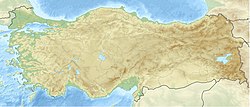Lawazantiya
Tatarlı Höyük | |
| Location | Adana Province, Turkey |
|---|---|
| Region | Cilicia |
| Coordinates | 37°7′22″N 36°3′3″E / 37.12278°N 36.05083°E |
| Type | tell |
| History | |
| Cultures | Kizzuwatna Hittites Hurrians Mitanni |
Lawazantiya (URULa-wa(-az)-za-an-ti-ya) was a major Bronze Age city in the Kingdom of Kizzuwatna and the cultic city of the goddess Šauška.[1] It was famous for its temple that got purification water from its seven springs.[2] Today the best candidate for the site is Tatarli Höyük which is known for its seven springs.[3][4]
History
[edit]Middle Bronze
[edit]During the Old Assyrian Trade Network into Anatolia it was mentioned as Luhuzantiya. The earliest mention of the city comes from the Old Assyrian documents as a trading colony in Kaniš, where the place Luḫuzatia is often mentioned, which is common to Lawazantiya.[5]
In the late 17th century BC, Lawazantiya was a target for Hittite expansion to the sea and the base of the military campaigns of Ḫattušili I (c. 1620 BC). He went northeast attacking Urshu and Hassu, which then got aid from Halap (Aleppo) and Carchemish.
Late Bronze
[edit]In Hittite texts the city is known as Lawazantiya (also: Lahuwazantiya, Lauwanzantiya or Lahuzzandiya), in Ugarit as Lwsnd[6] and in Assyrian Annals as Lusanda.[7] There is a Hittite document entitled "Festival of Teššub and Ḫebat of Lawazantiya" which has the king calling these deities in to open the spring festival.[8]
In the Telipinu Edict that Hittite ruler (c. 1525-1500 BC) reports that the city had rebelled and been retaken.[9]
In the 13th century BC, Hattušili III met and married Pudu-Heba, daughter of Pentipšarri, a priest of Šauška, in Lawazantiya. She was a strong promoter of Kizzuwatnean cults and traditions. [10]
For the Festival for Teššup and Ḫebat of Lawazantiya, see CTH 699.[11]
Location
[edit]The city is known to have been part of the Kizzuwatna region. Gojko Barjamovic considers Luḫuzatia and Lawazantiya to be two separate localities, with the former locating in Elbistan.[12] Meanwhile Lawazantiya might be located at Sirkeli Höyük. Tatarli Höyük has also been proposed as the location based on cylinder and stamp seals found at that site.[13]
References
[edit]- ^ Frayne, Douglas R. and Stuckey, Johanna H.. "Š". A Handbook of Gods and Goddesses of the Ancient Near East: Three Thousand Deities of Anatolia, Syria, Israel, Sumer, Babylonia, Assyria, and Elam, University Park, USA: Penn State University Press, 2021, pp. 318-337
- ^ CTH 475
- ^ [1]https://www.levantineceramics.org/sites/1535-tatarli-hoyuk
- ^ K.Serdar Girginer (2013) Tatarlı Höyük Treading in the Hittites' and Lawazantia's Footsteps
- ^ Philo Hendrik Jan Houwink Ten Cate. The Luwian Population Groups of Lycia and Cilicia Aspera. p. 19.
- ^ KTU2 2.40 line 10
- ^ "Historical Topography… and the Identification of Sirkeli Höyük". 2013. Archived from the original on 6 October 2015. Retrieved 27 July 2015.
- ^ Görke, Susanne. "Hurrian and Luwian Elements in the Kizzuwatna Religious Texts" Altorientalische Forschungen, vol. 49, no. 1, 2022, pp. 148-157
- ^ Bilgin, Tayfun. "3. The Top-level Offices of Hittite State Administration". Officials and Administration in the Hittite World, Berlin, Boston: De Gruyter, 2018, pp. 97-359
- ^ Martino, Stefano de. "5 Hatti: From Regional Polity to Empire". Handbook Hittite Empire: Power Structures, edited by Stefano de Martino, Berlin, Boston: De Gruyter Oldenbourg, 2022, pp. 205-270
- ^ [2]https://www.hethport.uni-wuerzburg.de/CTH/index.php?l=Lawazantija
- ^ Gojko Barjamovic. A Historical Geography of Anatolia in the Old Assyrian Colony Period. pp. 133–143.
- ^ Girginer, K. Serdar, and Dominique Collon. "Cylinder and Stamp Seals from Tatarli Höyük." Anatolian Studies, vol. 64, 2014, pp. 59–72

